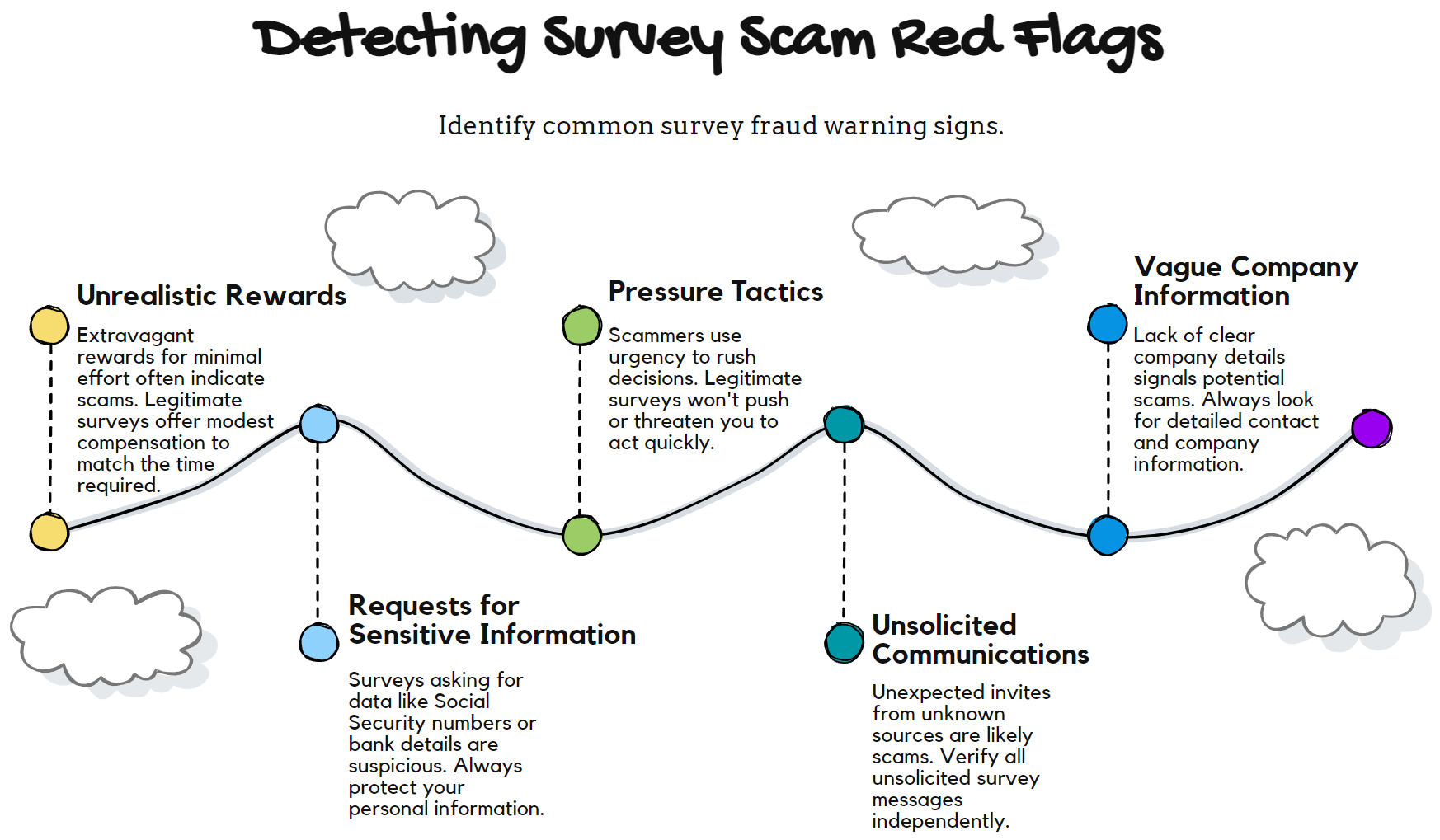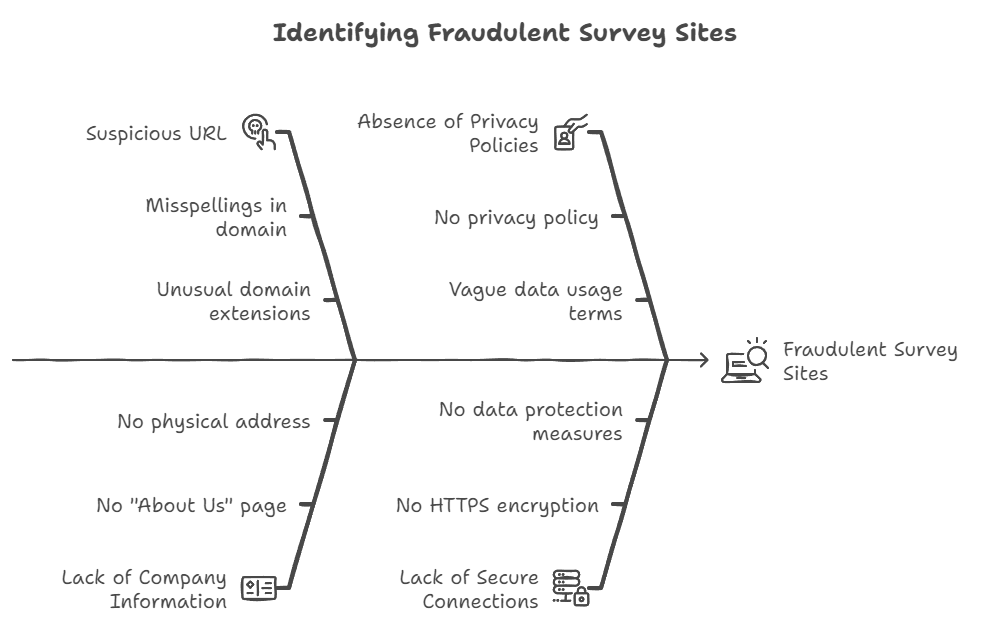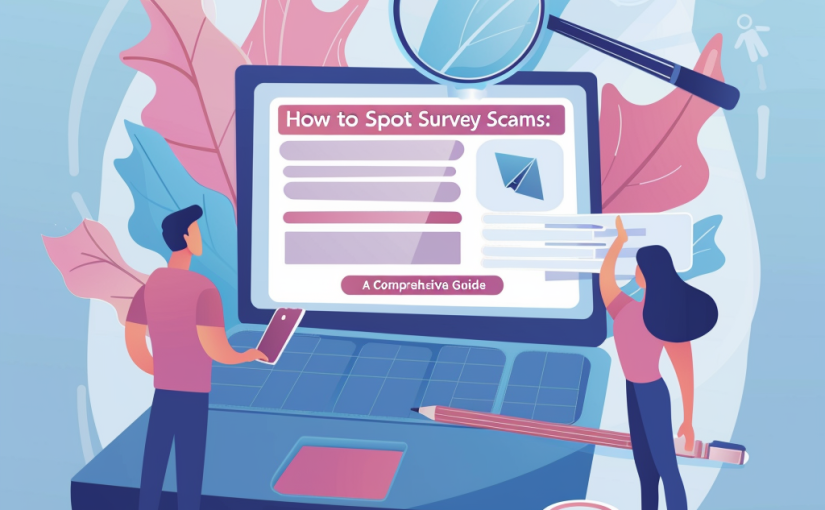In today’s digital landscape, online surveys have become popular for companies to gather consumer feedback and for individuals to earn extra income. However, this arena is also rife with scams that can compromise your personal information and financial security. This comprehensive guide will equip you with the knowledge to know how to spot survey scams, ensuring your online experiences remain safe and rewarding.
What are the most common red flags of survey scams?

Survey scams come in various forms, but they often share common characteristics. By familiarizing yourself with these red flags, you can protect yourself from falling victim to fraudulent schemes:
Unrealistic Rewards
Legitimate surveys typically offer modest compensation for your time. If a survey promises extravagant rewards like high-value gift cards or expensive gadgets for minimal effort, it’s likely too good to be true. Be especially wary of offers that seem disproportionate to the time and effort required.
Requests for Sensitive Information
Be cautious of surveys that ask for personal details such as your Social Security number, bank account information, or credit card numbers. Legitimate surveys rarely require such sensitive data. Remember, your financial information should be closely guarded and only shared when necessary.
Pressure Tactics
Scammers often create a sense of urgency to push you into hasty decisions. Be wary of surveys that claim to have limited spots or threaten to withdraw offers if not completed immediately. Legitimate survey opportunities rarely employ such aggressive tactics.
Unsolicited Communications
If you receive unexpected emails, texts, or calls about survey opportunities, especially from unfamiliar sources, treat them skeptically. Reputable survey companies typically require you to sign up before contacting you. Always verify the source of any unsolicited survey invitations.
Vague or Missing Company Information
Legitimate survey companies are transparent about their identity and operations. If a survey site lacks clear information about the company behind it, including contact details and a physical address, it’s a potential red flag.
How can you identify fake survey sites?

Distinguishing between legitimate and fraudulent survey websites is crucial. Here are some strategies to help you spot fake survey sites:
Check the URL
Carefully examine the website address. Scammers often use domain spoofing techniques to make their URLs appear legitimate. Look for subtle misspellings or unusual domain extensions. For example, a scam site might use “surveycompany.net” instead of the legitimate “surveycompany.com.”
Research the Company
Before participating in any survey, investigate the company behind it. Look for an “About Us” page, contact information, and a physical address. Legitimate businesses will have a clear online presence. Check for reviews and ratings on reputable consumer websites.
Look for Privacy Policies
Reputable survey sites will have comprehensive privacy policies detailing how they handle your personal information. The absence of such policies is a major red flag. Take the time to read through these policies to understand how your data will be used and protected.
Check for Secure Connections
Ensure the website uses HTTPS encryption, indicated by a padlock icon in the address bar. This helps protect your data during transmission. While not a guarantee of legitimacy, secure connections are a basic security measure that reputable sites implement.
Verify Professional Affiliations
Many legitimate survey companies are members of professional market research associations. Look for affiliations with organizations like the Market Research Society (MRS) or the American Association for Public Opinion Research (AAPOR).
What are common survey scam tactics to watch out for?
Scammers employ various techniques to deceive unsuspecting victims. Being aware of these tactics can help you avoid falling into their traps:
Phishing Surveys
These surveys are designed to steal your personal information under the guise of market research. They often ask for sensitive details that legitimate surveys would never require. Be particularly cautious of surveys that request information like your Social Security number or bank account details.
Pay-to-Participate Schemes
Some scams ask you to pay a fee to access “exclusive” survey opportunities. Remember, genuine survey companies pay you, not the other way around. If you’re asked to make any payment to participate in surveys, it’s almost certainly a scam.
Impersonation of Reputable Brands
Scammers may pose as well-known companies to gain your trust. Always verify the authenticity of survey invitations by contacting the company directly through their official channels. Don’t rely solely on the branding or logos used in the survey invitation.
Malware Distribution
Some fraudulent surveys aim to infect your device with malware. Be cautious of surveys requiring you to download software or click suspicious links. Legitimate surveys typically don’t require any downloads to participate.
Overpromising on Earnings
While earning money from surveys is possible, be skeptical of sites that promise unrealistic earnings. Legitimate survey opportunities typically offer modest compensation. If a site claims you can make a full-time income solely from taking surveys, it’s likely exaggerating or outright lying.
How can you protect yourself from survey fraud?
Taking proactive steps to safeguard your information is essential when participating in online surveys:
Use Reputable Survey Platforms
Stick to well-established survey sites with positive reviews and a track record of timely payments. Research the platform thoroughly before signing up or providing any personal information. Our list of trusted survey sites!
Create a Separate Email Address
Use a dedicated email address for survey participation to keep your primary inbox free from potential spam. This also makes it easier to manage survey-related communications and spot potential scams.
Never Share Financial Information
Legitimate surveys don’t require your bank details or credit card information. If asked, it’s likely a scam. Survey payments are typically made through secure third-party platforms or gift cards.
Trust Your Instincts
It probably is if something feels off about a survey or seems too good to be true. Don’t hesitate to walk away. Your intuition can be a powerful tool in identifying potential scams.
Keep Your Software Updated
Ensure your device’s operating system, web browsers, and antivirus software are up-to-date to protect against potential malware threats. Regular updates often include security patches that can help protect you from the latest threats.
Be Cautious with Personal Information
Even when dealing with legitimate surveys, be mindful of the personal information you share. Only provide what’s necessary and relevant to the survey topic. Consider the potential risks before sharing sensitive details.
Read Terms and Conditions
While often overlooked, the terms and conditions of survey sites can provide valuable information about how your data will be used and what you can expect from the platform. Take the time to review these documents before participating.
Final Thoughts
By staying informed and vigilant, you can enjoy the benefits of participating in online surveys while avoiding the pitfalls of scams. Always prioritize your personal and financial security when engaging with any online opportunity. If you encounter a suspected survey scam, report it to the appropriate authorities to help protect others from falling victim.
As the online survey landscape evolves, so will scammers’ tactics. Stay updated on the latest scam trends and security best practices to ensure you can confidently navigate the world of online surveys. With the right knowledge and precautions, you can safely participate in legitimate survey opportunities and contribute to valuable market research while potentially earning some extra income.
FAQ
Are all paid surveys legitimate?
No, not all paid surveys are legitimate. While many reputable companies conduct genuine market research, numerous scams exist to exploit unsuspecting participants. It’s crucial to thoroughly vet any survey opportunity before participating.
How much can I realistically earn from legitimate surveys?
Earnings from legitimate surveys are typically modest. Most participants can expect to earn a few dollars per hour, with occasional opportunities for higher-paying specialized surveys. It’s important to set realistic expectations about potential earnings.
Can I get scammed even if I don’t provide financial information?
Yes, scammers can use personal information gathered from surveys for identity theft or to target you with more sophisticated scams in the future. Always be cautious about the information you share online, even if it doesn’t seem directly related to your finances.
What should I do if I’ve fallen victim to a survey scam?
If you suspect you’ve been scammed, immediately change passwords for any accounts that may be compromised, contact your bank if you’ve shared financial information, and report the scam to relevant authorities such as the Federal Trade Commission (FTC) or your local consumer protection agency. Acting quickly can help minimize the potential damage.

